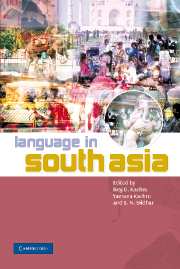Book contents
- Frontmatter
- Contents
- List of Figures
- List of Maps
- List of Tables
- Preface
- Acknowledgments
- List of Abbreviations
- Note on Transcription
- Introduction: languages, contexts, and constructs
- Part 1 Language history, families, and typology
- Part 2 Languages and their functions
- Part 3 Sanskrit and traditions of language study
- 8 Sanskrit in the South Asian sociolinguistic context
- 9 Traditions of language study in South Asia
- Part 4 Multilingualism, contact, and convergence
- Part 5 Orality, literacy, and writing systems
- Part 6 Language conflicts
- Part 7 Language and modernization
- Part 8 Language and discourse
- Part 9 Language and identity
- Part 10 Languages in diaspora
- References
- Subject Index
- Language Index
- Author Index
9 - Traditions of language study in South Asia
Published online by Cambridge University Press: 04 May 2010
- Frontmatter
- Contents
- List of Figures
- List of Maps
- List of Tables
- Preface
- Acknowledgments
- List of Abbreviations
- Note on Transcription
- Introduction: languages, contexts, and constructs
- Part 1 Language history, families, and typology
- Part 2 Languages and their functions
- Part 3 Sanskrit and traditions of language study
- 8 Sanskrit in the South Asian sociolinguistic context
- 9 Traditions of language study in South Asia
- Part 4 Multilingualism, contact, and convergence
- Part 5 Orality, literacy, and writing systems
- Part 6 Language conflicts
- Part 7 Language and modernization
- Part 8 Language and discourse
- Part 9 Language and identity
- Part 10 Languages in diaspora
- References
- Subject Index
- Language Index
- Author Index
Summary
We will focus in this chapter on two phenomena that are nothing short of extraordinary if one considers their antiquity, richness, precision, and significance to human thinking on language: Indian engagement with language in general and the study of Sanskrit traceable in its roots to the grammar of Pāṇini in particular. The latter, as will be clear below, is a part of the former. However, it is a part that surpasses all other parts in its achievement, longevity, sustained vitality, and influence. Therefore, it deserves to be treated somewhat extensively in a space of its own. This is what the present chapter will do in its latter half.
Manifold interest in manifestations of language
The passion that educated Indians of the premodern period displayed for preserving information on speech forms, particularly of the languages of the Indo-Aryan family, is unmatched in world history.
Even minute differences in the pronunciation of words were preserved in a variety of ways: (a) in recensions of Vedic texts, (b) in works highlighting the peculiarities of Vedic recensions, (c) in discourses on the articulation aspect of phonetics, (d) in grammars, (e) in lexicons, (f) in treatises that sought to guide literary authors and the readers of belles lettres, (g) in monographs that discussed expressions suspected to be ungrammatical, (h) in booklets that listed different forms caused by alterations such as “b : v” or “ś : ṣ : s” of what was believed to be essentially the same word, and (i) in commentaries that explained literary texts abounding in puns.
- Type
- Chapter
- Information
- Language in South Asia , pp. 189 - 220Publisher: Cambridge University PressPrint publication year: 2008
- 1
- Cited by



